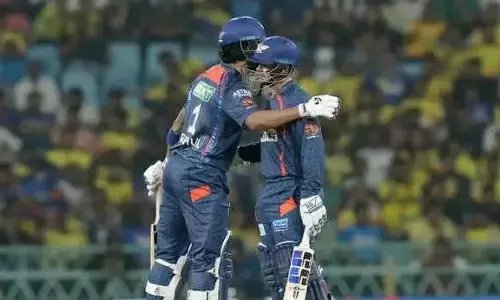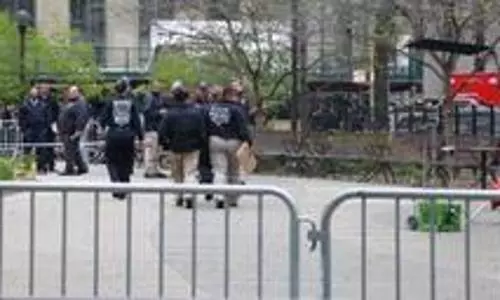
NJAC row: CJI HL Dattu has put his own 5-judge bench in an awkward position
text_fieldsThe conflict between the heads of the judiciary and the executive has been in place for long. With the formation of the Narendra Modi government, however, the conflict has seen more directness and bluntness.
Whether it is the top judiciary's gratuitous remarks on what are essentially policy matters that are supposed to exclusively be in the domain of the executive, or the PM's concern that 'five-star activists' may be bringing about undue pressure on the judiciary, the tension has been palpably visible.
Indeed, to be sure, much of this conflict may even be healthy in a robust democracy like ours. These conflicts - the push and pull, the periodic biting of the bullet from both sides - help the nation evolve to an ideal healthy state of separation of powers.
But what happens when the interface between the two come to a screeching halt? What happens when one wing of our democracy refuses to engage in this evolution process, potentially reversing months of assiduous efforts towards that ideal state? We then have a constitutional crisis of sorts that has far-reaching ramifications.
Ever since the National Judicial Appointments Commission (NJAC) Bill was made into law through a constitutional amendment (and, therefore, securing the consent of an overwhelming majority of the legislatures), there has been apparent tension between the executive and the judiciary. The reasons are obvious.
For a good two plus decades, the procedure for the appointment and transfer of judges of high courts and the Supreme Court was performed by a collegium consisting of the Chief Justice of India and four most senior associate judges of the SC. The executive had no role whatsoever.
This rather opaque procedure was roundly criticised, particularly by members of the judiciary who alleged or insinuated that factors other than merit may often have been instrumental in this decision-making. For example, a former Gujarat CJ alleged that he was denied SC judgeship because he had opposed high court judgeship for the then CJI Altamas Kabir's sister. Also, here is retired Justice Markandey Katju’s recollecting an incident on the controversial appointment of an HC judge.
It is useful to note that the collegium system came into being not by any Act of Parliament or by any express stipulation in the Constitution, but by the Supreme Court itself interpreting the Constitution. Years of debate on the soundness of this procedure led to the formulation of a National Judicial Appointments Commission.
Article 124A(1) stipulates the constitution of the NJAC. It consists of the CJI, two judges of the SC next to the CJI in seniority, the Law Minister and two eminent persons who are nominated by a committee consisting of the PM, CJI and Leader of Opposition (or leader of single largest Opposition party in the Lok Sabha).
Therefore, the CJI is not only a member of the NJAC for appointing and transferring judges of higher courts, he is also a member of a committee which selects the two eminent persons who then join the rest in appointing/transferring judges.
Unsurprisingly, the NJAC law was challenged in the Supreme Court. Amidst this challenge, a question arose on the embarrassment it would result to the judges appointed by the NJAC if the Supreme Court eventually were to hold the NJAC unconstitutional. The Attorney General assured the SC that no fresh appointments of judges would take place before the SC ruled on the validity of NJAC and that the NJAC, once constituted, would only deal with the confirmation/extension of existing Additional Judges in high courts. The SC order records this assurance.
The SC was assured that NJAC would be constituted by 11 May. In that regard, therefore, the PM’s office requested the CJI to attend a meeting to select two eminent persons - the only members of the NJAC who have to be specifically appointed. Yesterday (27 April), however, the CJI wrote back to the PM refusing to attend the meeting stating it is "neither appropriate nor desirable" till the bench decided the validity of the NJAC system.
This effectively halts the formation of the NJAC even to do the limited task the Centre assured it will do.
There are two problems with the CJI's approach - one, its soundness and, two, its ramifications.
Once the NJAC Act and the corresponding constitutional amendment were duly enacted and the Act notified, a statutory duty was bestowed upon the CJI to perform two tasks stipulated in the law - one, be a part of the committee selecting the two eminent persons and, two, be a part of the NJAC.
Unless the operation of the NJAC Act is stayed by the SC Bench hearing this matter, the law, with all its rights and obligations, remains in force. This is what the SC reportedly observed during the hearing - "The Act has to be implemented till we stay it or quash it…and we have not done either. So the Act is implemented". Therefore, for the CJI to refuse to be a part of the committee to select eminent persons is really a refusal to perform a statutory duty.
Moreover, this approach puts judges presiding over the Bench hearing the validity of the matter - judges junior to him - in an awkward spot. To be sure, the current situation is rather sensitive. The legislature and executive have together ended the sole prerogative of the top five judges to decide how judges across higher courts are appointed and transferred. And the validity of the law used to end that system is being examined by the judges.
That is why, during the pendency of this matter, it is highly desirable that the Centre and the SC arrive at a consensus on issues that need immediate addressing - for example, confirmation/extension of additional judges. This is why the Centre assured the SC bench that NJAC will only deal with that and nothing else till SC decides on the validity of NJAC.
The CJI's approach, however, effectively renders this consensus meaningless. What, one wonders, would the SC Bench hearing this matter do now? Would it, as an interim arrangement, let NJAC deal with confirmation/transfer of additional judges without the eminent persons? Even then, the CJI is ex-officio a member of the NJAC as well. What if he chooses not to participate?
This crisis - quite frankly, created by one individual - has muddied the already sensitive waters, one that was totally avoidable.
(The views and opinions expressed in this article are those of the authors)






















